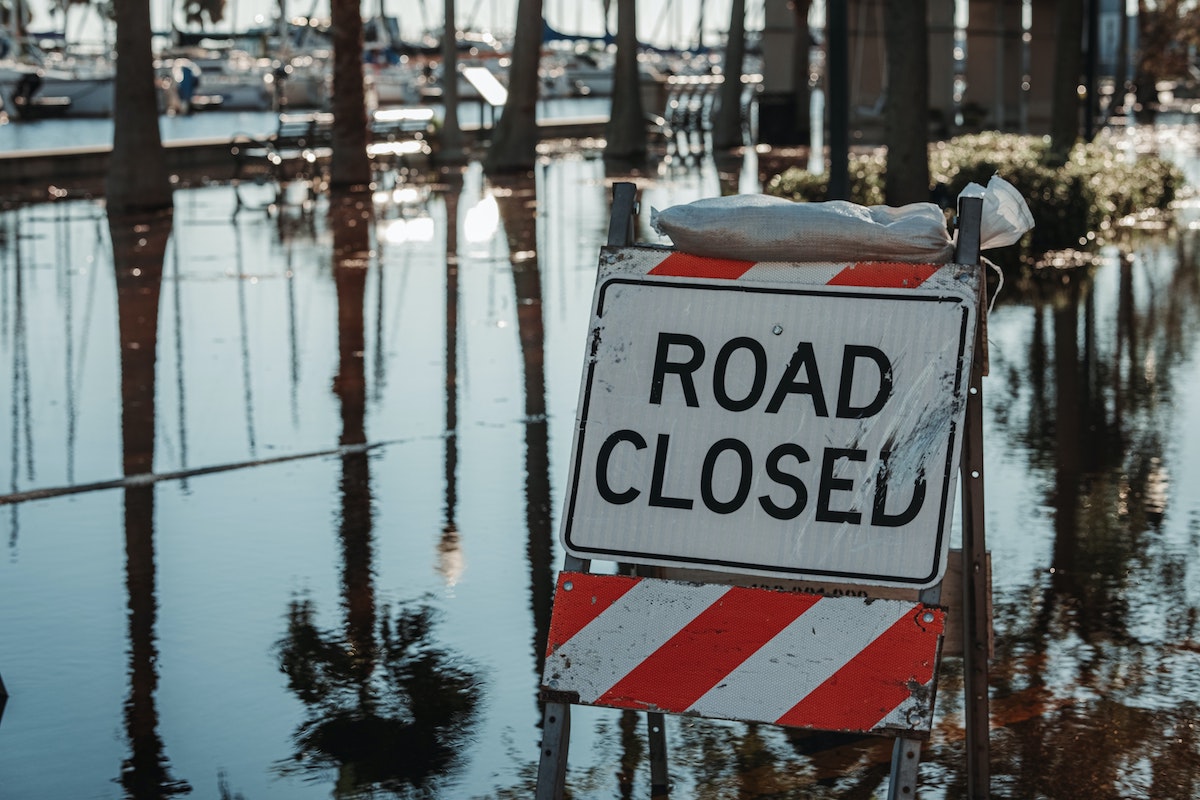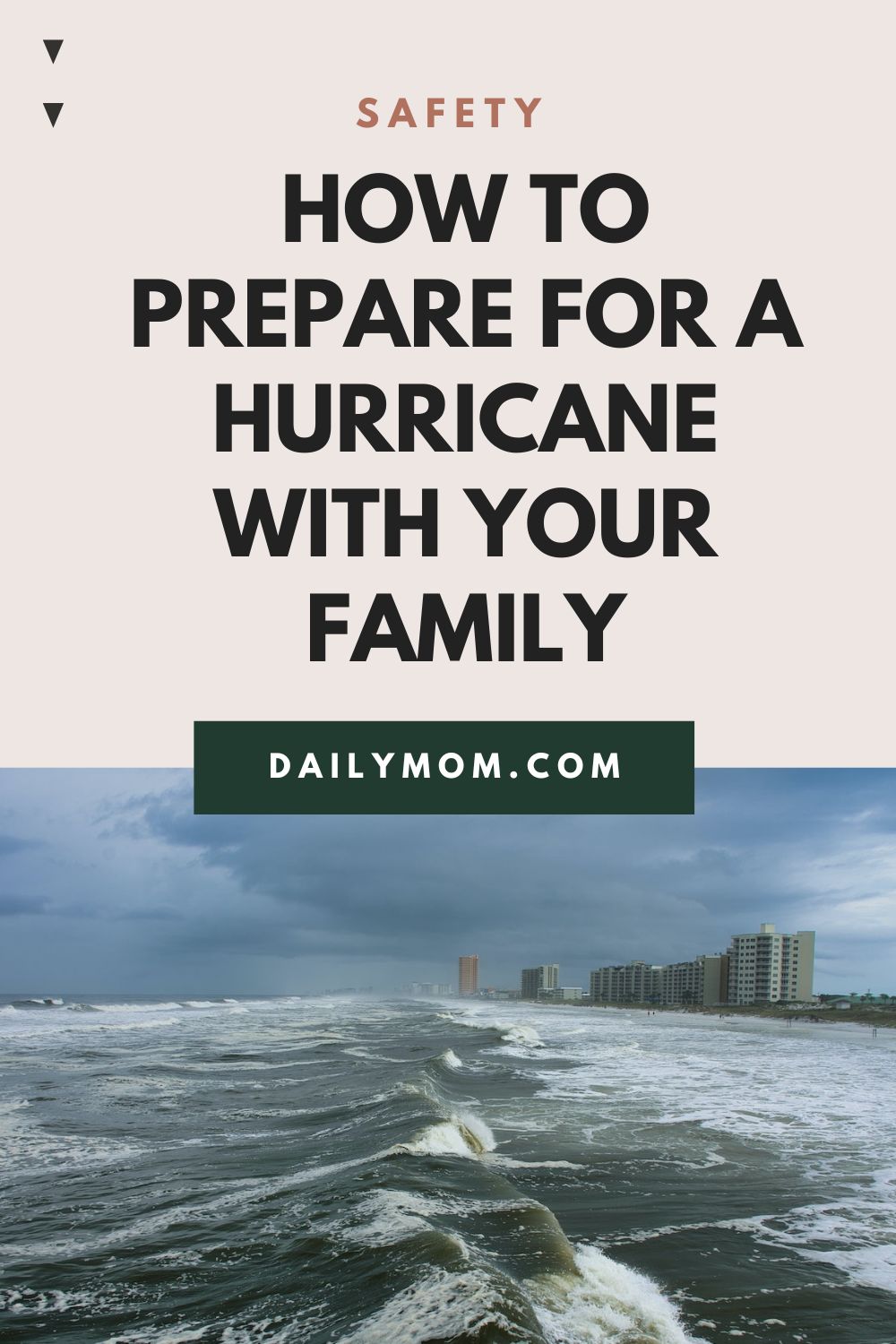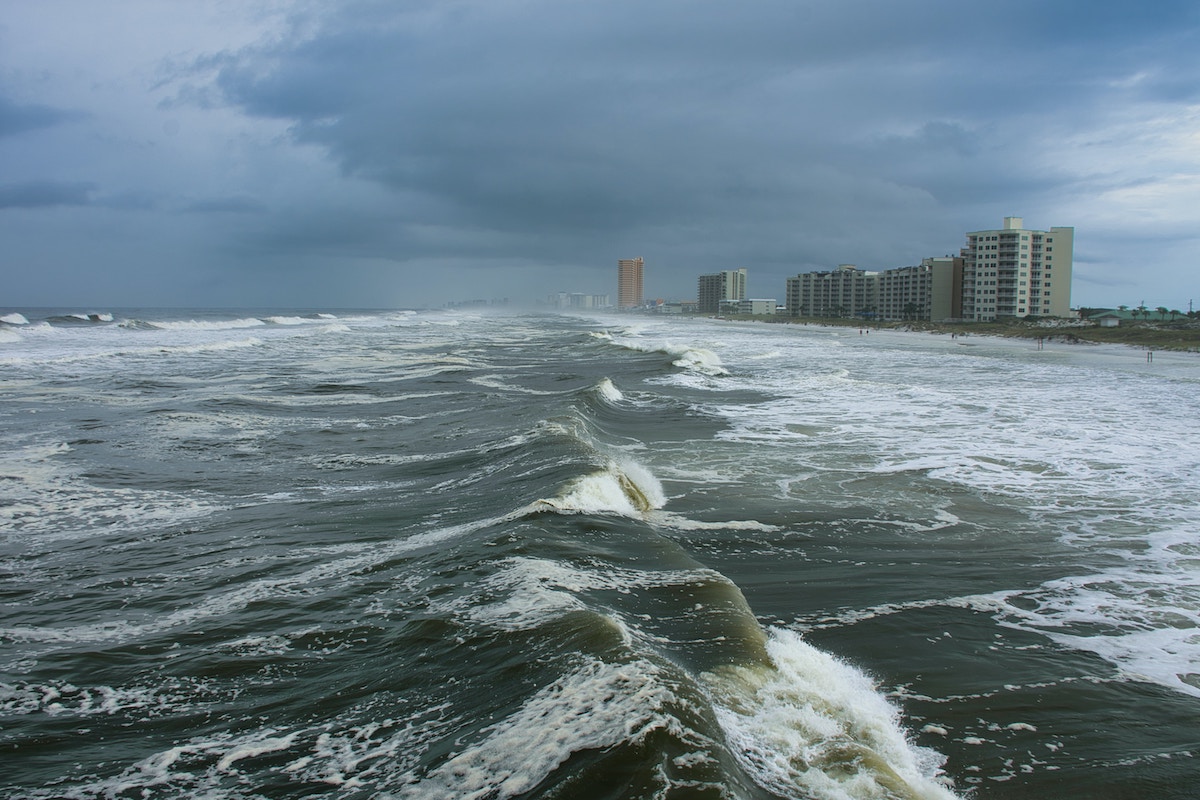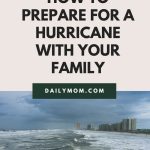As hurricane season looms, families all over the world are preparing for what could be a very active year of severe storms. Now more than ever, it’s important to equip ourselves with the knowledge and tools to protect ourselves and our families, especially if we have young children. Whether or not a hurricane is forecasted in your area, understanding how to prepare for a hurricane and what to do in the event of one can help ensure the safety of not only your family but also your home and the community you live in.
The key to a successful hurricane preparation plan is planning ahead. Storms can develop quickly, with very little time to react, so it’s best to have a strategy in place before the storm arrives. This may include creating an emergency supply kit, updating/making evacuation plans, and discussing safety measures with your children. The last of these is especially important if you have children involved in the preparation process, as it will help them understand the severity of a hurricane and how they should act during and after one. Having a plan of action that’s been discussed in advance will help everyone stay calm and know exactly what to do in the event of a natural disaster.
Preparing For Hurricane Season
Knowing how to prepare for a hurricane is a difficult but necessary process for families living in areas prone to inclement weather. Hurricanes, with their high winds and heavy rains, can cause a great deal of destruction and devastation, but with the right preparation and knowledge, you can weather the storm.
It all starts with staying informed and up-to-date on the latest hurricane news. Tune into your local television stations for the most recent updates about the storm and its projected path. Additionally, many of these stations have apps that allow you to find the latest breaking news right on your phone.
The next step is to make sure you have the necessary supplies you’ll need to stay safe and comfortable, including plenty of food, water, and any medications you might need. It’s important to make sure that you have enough of these items to last your family for at least three days in the event of a power outage. Additionally, you should have a fully charged portable battery or battery-powered radio on hand, as well as first-aid supplies and flashlights.
Finally, it’s important to have an emergency plan in place for your family. This plan should include an evacuation route, a meeting place for family members, and an emergency contact for each family member. Make sure that everyone in your family is familiar with the plan and that a copy is kept in a safe place.
By following these steps, you will be better prepared for any hurricane that might come your way. Having the right knowledge and supplies, as well as an emergency plan, will help ensure that you and your family are able to weather the storm.
Understanding Hurricanes: What You Need to Know
Knowledge is power, so getting the facts about hurricanes is an important step when it comes to preparing your family for a hurricane. Hurricanes are powerful storms with high winds that can have a devastating impact on the lives of those in its path. A hurricane can cause massive destruction to infrastructure, homes, and livelihoods. Knowing what to expect and how to prepare your family for a hurricane can help reduce the potential damage and minimize the disruption to your family’s lives.
The first step in preparing your family for a hurricane is to understand what a hurricane is. A hurricane is a type of tropical cyclone, a system of storms with high winds and heavy rains that form in the tropical ocean regions of the world. Hurricanes are categorized according to the strength of their wind speed and the amount of rainfall they can produce. Hurricanes can range from category 1, with wind speeds up to 74 mph, to category 5, with wind speeds of more than 157 mph.
Once you understand the basics of a hurricane, it’s important to stay informed about the storm’s path and intensity. The National Hurricane Center (NHC) provides a wealth of information to help you track the storm’s progress, including forecasts, maps, and advisories. The NHC also issues tropical storm and hurricane watches and warnings, which tell you when a hurricane is imminent and what type of preparation is necessary.
When preparing for a hurricane, it’s important to think about the specific needs of your family. If you have children, it’s essential to make sure they are aware of the danger and know what to do in the event of an emergency. Talk to your children about the hurricane, explain the risks, and make sure they know where to go for safety. It’s also a good idea to make sure the children know how to contact friends and family in case of an emergency.
It’s also important to prepare an emergency kit with supplies that you can take with you in the event of an evacuation. The kit should include items such as food, water, first aid supplies, flashlights, and batteries. You should also include important documents such as birth certificates, passports, and insurance policies.
Emergency Plan: Creating a Family Communication Strategy
With the threat of hurricanes and other natural disasters looming, it’s important to prepare your family for the worst. You need to create an emergency plan that includes a family communication strategy. This communication strategy should include the most effective ways to reach your family members during an emergency.
Before creating your emergency plan, it’s important to discuss the potential risks with your family. Talk about what would happen and how you would respond in the event of a natural disaster. This will help everyone understand the risks and create a greater sense of urgency for everyone to be prepared.
Once you and your family have discussed the potential risks, it’s time to create an emergency plan that includes a family communication strategy. Start by identifying the most effective methods for each family member to communicate in an emergency, such as text messaging, phone calls, email, or social media. Then decide on the best location for each family member to meet during a crisis.
Next, it’s important to plan ahead so that you can communicate quickly and easily during an emergency. Make sure your family has a list of emergency contact numbers and keeps them up-to-date. Consider having a family meeting every few months to review the plan and update contact information.
It’s also important to discuss the importance of keeping calm during an emergency and plan for how your family will handle any stressful situations. You should also discuss the importance of staying informed and making sure everyone knows where to get information during an emergency.
Finally, make sure you have a plan for how to stay connected after an emergency. This may include setting up a designated meeting place or having family members check in with each other at regular intervals.
Creating a family communication strategy for an emergency plan is essential for keeping your family safe during a natural disaster. By discussing the potential risks, creating a plan for how to stay connected, and staying informed, you can make sure your family is prepared for the worst.
Supplies: Gathering Necessary Items and Disaster Kits
Another important step to preparing for a hurricane is to have the necessary supplies ready for your family to weather the storm. In addition to food and water, there are other items to consider for both your family and your home. Gather supplies like flashlights, extra batteries, pet food, and first aid kits. If you have children, be sure to make sure you have enough supplies for them as well.
Creating a disaster kit is essential when preparing for a hurricane. It should contain items like basic tools, nonperishable food, water, a first aid kit, a fire extinguisher, a whistle, a radio, and a manual can opener. Additionally, you should have a flashlight and extra batteries, a map of the area, and copies of important documents like birth certificates and insurance policies.
You may also need to stock up on additional supplies like plywood to board up windows or sandbags to protect your home from flooding. Depending on the severity of the hurricane, you may also want to consider investing in a generator or extra fuel such as gasoline. It is also important to have medical supplies on hand such as prescription medications and any other medications your family may need.
When gathering supplies, it is important to think ahead and plan for the worst-case scenario. It is often useful to create a checklist of items that you need to gather and make sure that you have everything in order before the hurricane hits. Make sure to double check that you have the necessary supplies for your family and be sure to keep items in a safe location. By taking these precautions ahead of time and preparing for a hurricane, you and your family can be better prepared for any situation.

READ MORE: Moving to Hurricane Territory? Here’s What You Need to Know.
Home Preparation: Protecting Your Home
Protecting your home is an essential step to prepare for a hurricane. It’s important to make sure family members, including children, are safe, but protecting your home is also a priority. Here is how to prepare your home for a hurricane:
First, it’s important to assess the level of protection you need for your home. Do you need to invest in storm shutters and boards? Should you install hurricane-proof windows and doors? How much protection do the walls of your home need? All of these are important questions to consider.
Next, it’s important to secure the outside of your home. If there are items that could become flying projectiles during a hurricane, such as bikes and patio furniture, these should be moved indoors or stored in secure locations. Make sure trees and bushes are trimmed, so that they don’t become a hazard during high winds.
Inside your home, start by preparing an emergency kit. Have items such as food and water, first-aid supplies, flashlights, batteries and important documents ready to go. If you plan on evacuating, make sure you have all the necessary items gathered together in a place where they can be easily accessed.
Additionally, you should check that your home’s electrical and plumbing systems are prepared. Make sure your home’s generator is functional and has enough fuel to run for several days. If you have a sump pump, check that it’s working properly and has enough power to keep your basement dry.
Finally, make sure your family knows the plan. Do you plan to evacuate if the storm hits? Will you stay home and weather the storm? Make sure all family members know the plan and the routes you’ll take if you plan to leave. It’s also important to discuss the plan with children so they can be prepared for anything that might occur.
The steps to prepare for a hurricane can be daunting, but by doing them, you can ensure you’ve done everything you can to prepare your house for a hurricane. Start by assessing the necessary levels of protection for your home, securing the outside, preparing an emergency kit, checking your home’s electrical and plumbing systems, and making sure to have a plan of action. With these steps, you can have peace of mind that your home is well-protected.
READ MORE: Disaster: Helping Family From a Distance
Evacuation: Knowing When and Where to Go
When a hurricane is looming on the horizon, it’s important to be sure that your family is prepared for the worst-case scenario. As part of this preparation, it’s important to consider the possibility of needing to evacuate your home. Knowing when and where to go in the event of an evacuation can help reduce the stress associated with preparing for a hurricane.
When to Evacuate
The decision of when to evacuate your home should be based on both the recommendations of local and national officials, as well as your own instincts. If the hurricane is an impending threat, the local authorities may declare a state of emergency and provide instructions for what to do. Obey their instructions, as they are likely to have the most up-to-date information and directions to ensure your safety. Even if they don’t call for an evacuation, you may feel that it is the safest course of action for you and your family. Pay attention to the warnings and your own intuition.
Where to Go
If it’s time to evacuate, the next step is to determine where to go. When a hurricane is imminent, the best option for many families is to stay with a trusted friend or family member who lives in a safe location. If this is not an option, it may be possible to stay in a hotel or other public facility. If you don’t have the means to do this, local authorities may provide resources for those who need assistance.
Planning Ahead
Planning ahead is the key to successful evacuation. As you prepare for a hurricane, be sure to make a plan with your family regarding how to evacuate. This includes deciding who will drive, which route to take, and where to go. It’s also important to make sure your car is well-stocked with supplies in case of a long journey. Make sure you have a full tank of gas, plenty of food and water, flashlights, a first aid kit, and any other necessary items. Additionally, make sure that your family is aware of the plan, so that everyone knows what to do if the time comes to evacuate.
Special Considerations
There are also some special considerations when you have children. If you have very young children, it’s important to plan ahead so that you have the necessary items to care for them during the evacuation. Pack extra clothing and diapers, as well as toys, snacks, and other items to make sure they have everything they need as you prepare for a hurricane.
READ MORE: Decision Not to Evacuate Ahead of Hurricane Florence Sparks Backlash

After the Storm: Dealing with Damage and Cleanup
After the storm has passed, it is important to start the cleanup process as soon as possible. Hurricane season can leave extensive damage from flooding, high winds, and other natural disasters. Dealing with the aftermath of a hurricane can be an overwhelming task, but there are steps you can take in the interim to help ensure the safety of yourself and your family.
Before returning to the property, it is important to know the potential risks. Be aware of potential hazards such as downed power lines, broken glass, and standing water. It may be best to wait for the all-clear from local authorities before returning.
Once the area has been deemed safe, the first step in the cleanup process is to assess the damage. Make sure to take pictures of the damage before beginning to clear it, as this will help in filing an insurance claim. Pay special attention to areas of the property that are prone to flooding, such as the basement or areas near the coast. If there is severe structural damage, it is best to consult an engineer or a building inspector to determine if the building is safe to enter.
The next step is to start the cleanup process. This includes removing debris from the property, such as fallen trees and branches, as well as any items that were swept up in the storm surge. If the property has been flooded, it is important to dry out the area as soon as possible. This will help to prevent any further damage to the structure and prevent the growth of mold. Remove and discard any items that have been damaged beyond repair.
If the property has been left without power, it is important to check the generator before turning it on. Turn it off if the generator has been submerged in water or appears to be damaged. Even with a generator, it is important to take safety precautions, such as using flashlights or lanterns instead of open flames.
During this time, it is also important to stay informed on any health advisories. Check local health and wellness websites for any warnings on food, water, and air quality. Check for any boil water advisories or any other warnings that may be in effect.
When you prepare for a hurricane, it’s important to consider the aftermath which can be difficult to deal with, following these steps can help to ensure a safe and speedy recovery. Preparation and safety should always take priority when it comes to dealing with damage and cleanup
Prepare for the Worst, Hope for the Best
When it comes to tips on how to prepare for a hurricane with your family, it is important to plan ahead and have a strategy in place. One of the most important steps in that process is family preparedness. This means making sure everyone in the family is aware of what needs to be done, and that they understand the impact that a hurricane can have.
Communication is key to family preparedness, and it is important to ensure that everyone in the family is on the same page, and knows what to do if a hurricane occurs. This includes making sure that each family member knows what the evacuation plan is, and how to be safe during the storm. It is also important to make sure that each family member is aware of any specific needs that may arise during the storm, such as medical needs or special accommodations for young children.
Once the family is prepared, it is important to take steps to protect your home and belongings from the hurricane. This includes securing windows, doors, and other openings, and making sure that valuable possessions are stored in a safe, secure place. It is also important to have an emergency evacuation plan in place.
Finally, it is important to make sure that your family is aware of any resources that may be available to them during the hurricane. This may include shelters, food banks, and other emergency support. Knowing what is available can help to make sure that your family is taken care of during the storm.
By taking the time to plan ahead and prepare your family with children for a hurricane, you can ensure that everyone is safe during the storm. Make sure to take the necessary steps to be prepared, and to teach your family what needs to be done in the event of a hurricane. By doing so, you can weather the storm and come out safely on the other side.
WANT TO READ MORE?
Check out What We Learned About Hurricane Preparedness After Hurricane Florence for more Hurricane tips.
CONNECT WITH DAILY MOM
💖 NEWSLETTER: DAILY READS IN YOUR INBOX 💖
Sign up to receive our picks for the best things to do, see and buy so you can relax and focus on more important tasks! Let us help you be the best version of yourself you can be!
BE SOCIAL WITH US
📌 LOVE IT? PIN IT!📌










































